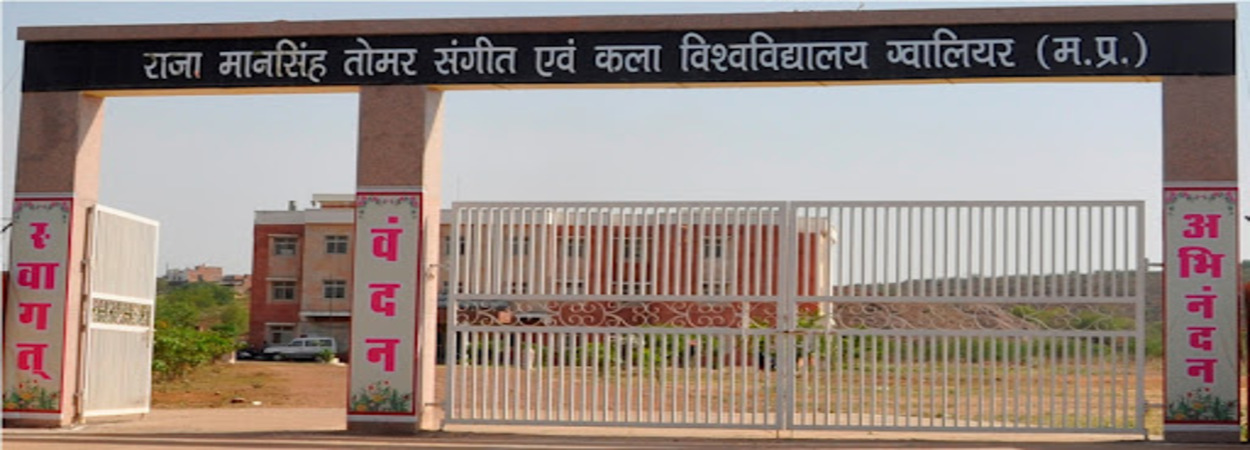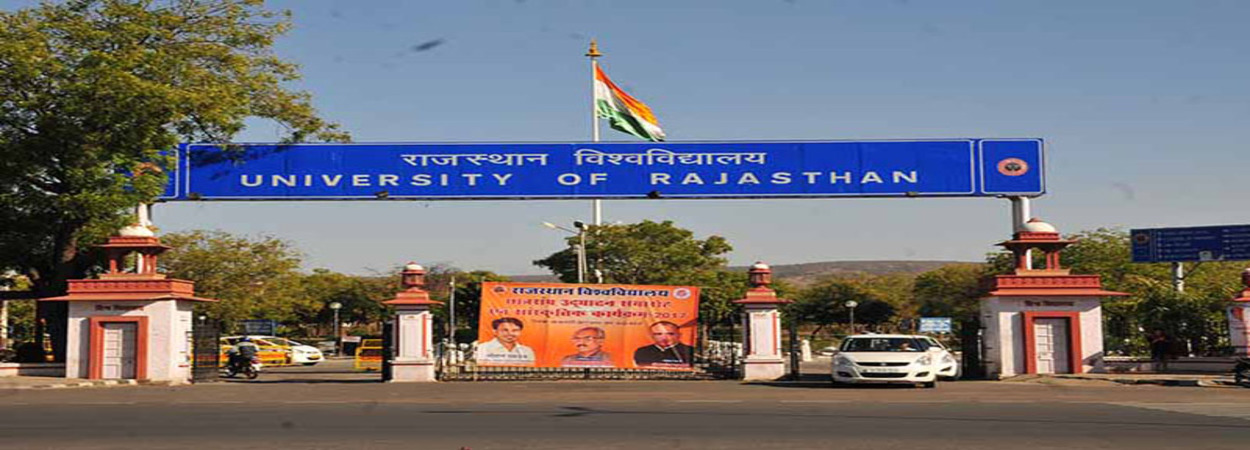Introduction about Ph.D. From Raja Mansingh Tomar Music & Arts University
Raja Mansingh Tomar Music & Arts University, situated in the culturally rich state of Madhya Pradesh, is a premier institution dedicated to the promotion of music, arts, and academic research. Its Ph.D. program is meticulously designed to nurture scholarly excellence and foster innovative research in diverse areas of music and arts. The university’s curriculum is uniquely structured to blend traditional artistic heritage with modern research methodologies, thereby creating an environment that encourages both creative expression and academic rigor. Candidates enrolled in this doctoral program are exposed to a wide spectrum of subjects ranging from classical music theory to contemporary art practices, ensuring that they gain a comprehensive understanding of their discipline.
Under the expert guidance of accomplished faculty members, students are provided with state-of-the-art research facilities, extensive digital libraries, and dedicated performance spaces. The program not only emphasizes theoretical learning but also provides ample opportunities for practical application through live performances, workshops, and collaborative projects. This integrated approach ensures that doctoral candidates develop critical analytical skills, innovative research techniques, and a deep appreciation for the rich cultural heritage inherent in the fields of music and arts. Overall, the Ph.D. program at Raja Mansingh Tomar Music & Arts University prepares scholars to make significant contributions to both academic research and the broader artistic community.
With a focus on interdisciplinary studies and experiential learning, this program is ideal for individuals passionate about advancing the boundaries of knowledge in music and arts. The supportive academic environment and the university’s commitment to fostering innovation make it an excellent choice for aspiring researchers seeking to leave a lasting impact on their fields.
Fee Structure for Ph.D. in Raja Mansingh Tomar Music & Arts University
The fee structure at Raja Mansingh Tomar Music & Arts University is designed to provide quality education at an affordable cost. Below is an overview of the typical fee components for the Ph.D. program:
| Tution Fee Per Year | Registration | Total Fee |
|---|---|---|
| Rs. 50,000 | Rs. 8,000 | Rs. 58,000 |
Admission Process For Ph.D. in Raja Mansingh Tomar Music & Arts University
The admission process is structured to ensure that only candidates with a strong academic background and a passion for research in music and arts are selected. The process includes several key stages:
- Review the eligibility criteria and admission guidelines on the official university website.
- Complete the online application form with detailed personal, academic, and research information.
- Submit all required documents including academic transcripts, a comprehensive research proposal, and identity proofs.
- Sit for a written entrance examination designed to evaluate your research aptitude and subject knowledge.
- Attend a personal interview with the selection panel to discuss your research interests and career aspirations.
- Receive the final admission decision based on your overall performance in the examination and interview.
It is essential to adhere to application deadlines and ensure that all documents are complete and accurately submitted.
Ph.D. Subjects in Raja Mansingh Tomar Music & Arts University
The Ph.D. curriculum covers a wide range of subjects that provide a solid foundation in both traditional and contemporary aspects of music and arts. The subjects are designed to promote interdisciplinary research and foster creative innovation. Below is a table outlining some of the core subjects:
| Subject | Description |
|---|---|
| Advanced Music Theory | Explores in-depth concepts of music composition, theory, and analysis. |
| Contemporary Art Practices | Examines modern artistic trends, techniques, and critical theories. |
| Research Methodology in Arts | Focuses on qualitative and quantitative research methods specific to arts and humanities. |
| Interdisciplinary Studies in Music & Arts | Encourages integration of diverse disciplines to foster innovative research. |
Document Required For Ph.D. in Raja Mansingh Tomar Music & Arts University
A complete set of documents is essential for processing your Ph.D. application. Applicants must ensure that the following documents are submitted:
- Academic Transcripts and Degree Certificates from all previously attended institutions.
- A detailed Research Proposal outlining your research objectives, methodology, and expected outcomes.
- A comprehensive Curriculum Vitae (CV) highlighting your academic, research, and professional achievements.
- Proof of Identity such as Aadhaar card, Passport, or any other government-issued ID.
- Letters of Recommendation from professors or professionals who can attest to your research potential.
- A Statement of Purpose (SOP) that details your motivation for pursuing a Ph.D. and your long-term career goals in music and arts.
Make sure all documents are current, verified, and formatted according to the guidelines provided by the university.
Raja Mansingh Tomar Music & Arts University Ph.D. Syllabus
The Ph.D. syllabus is designed to offer a comprehensive educational experience that blends rigorous academic coursework with practical research training. The curriculum is divided into several phases to facilitate systematic learning and research development. Below is a sample breakdown of the syllabus:
| Phase/Semester | Subject/Module | Credits/Weightage |
|---|---|---|
| Phase I | Core Research Methodology & Foundational Courses | 20 |
| Phase II | Advanced Theoretical Concepts & Elective Courses | 15 |
| Phase III | Interdisciplinary Research & Data Analysis | 25 |
| Phase IV | Thesis Writing, Defense & Publication | 40 |
The syllabus is periodically reviewed and updated to incorporate the latest trends and technological advancements in the fields of music and arts.
Raja Mansingh Tomar Music & Arts University Research Methodology
The research methodology training is a cornerstone of the Ph.D. program, equipping you with the tools and techniques required for conducting high-quality research. Key components of the training include:
- Developing a comprehensive research framework and formulating a detailed proposal.
- Training in both qualitative and quantitative research methods tailored to arts and music studies.
- Workshops on advanced data analysis techniques and the application of statistical tools in research.
- Emphasis on ethical research practices and maintaining rigorous standards of academic integrity.
- Regular mentoring sessions and peer reviews to continuously refine your research approach.
Raja Mansingh Tomar Music & Arts University Highlights
Raja Mansingh Tomar Music & Arts University is renowned for its unique blend of traditional artistic heritage and modern academic excellence. The following table highlights the key features of the institution:
| Aspect | Details |
|---|---|
| Established | A leading institution committed to the promotion of music and arts research |
| Location | Madhya Pradesh, India – A region rich in cultural heritage and artistic traditions |
| Accreditation | Nationally recognized for academic excellence and innovative research in the arts |
| Facilities | Modern laboratories, performance halls, digital libraries, and collaborative research centers |
| Faculty | Experienced academicians, musicians, and art experts providing personalized mentorship |
| Collaborations | Partnerships with leading cultural institutions and research organizations |
| Student Support | Scholarships, career counseling, research funding, and comprehensive academic guidance |
How To Apply For Ph.D. in Raja Mansingh Tomar Music & Arts University
The application process at Raja Mansingh Tomar Music & Arts University is designed to be straightforward and efficient. Follow these steps to submit your application:
- Visit the official university website and navigate to the Ph.D. admissions section.
- Review the eligibility criteria and detailed admission guidelines carefully.
- Fill out the online application form with accurate personal, academic, and research details.
- Upload all required documents, including academic transcripts, research proposal, CV, and identity proof.
- Pay the application fee as per the instructions provided on the portal.
- Submit your application before the deadline and keep a copy for your records.
- Prepare for the entrance examination and personal interview conducted by the selection panel.
- Monitor your email and the application portal for updates regarding your admission status.
Courses After Ph.D. in Raja Mansingh Tomar Music & Arts University
Upon completing the Ph.D. program, graduates have several opportunities to further enhance their expertise and career prospects. Raja Mansingh Tomar Music & Arts University offers advanced courses and professional development programs designed to support lifelong learning and career advancement. Options include:
- Post-Doctoral Research Programs
- Advanced Certificate Courses in Contemporary Music & Arts
- Executive Leadership and Academic Management Training
- Specialized Workshops and Seminars for Skill Enhancement
- Industry-Academia Collaborative Programs and International Exchange Initiatives
Raja Mansingh Tomar Music & Arts University Scholarship
Raja Mansingh Tomar Music & Arts University is dedicated to supporting its Ph.D. candidates through a comprehensive scholarship program that alleviates financial burdens and fosters academic excellence. These scholarships provide essential financial assistance, covering tuition fees, research grants, and in some cases, a living stipend. This robust financial support enables students to focus entirely on their research projects without the distraction of financial constraints. Awarded on the basis of academic merit, research potential, and financial need, the scholarship program reflects the university’s commitment to nurturing outstanding scholars in the field of music and arts. Detailed eligibility criteria, application procedures, and deadlines are available on the official website.
- Merit-based awards for exceptional academic performance.
- Need-based financial support to cover tuition and research expenses.
- Research grants for conference participation and publication fees.
- Opportunities for international collaborations and academic exchanges.
- Dedicated mentorship and career development support included in the scholarship package.
Raja Mansingh Tomar Music & Arts University FAQ's Regarding Ph.D.
Below are some frequently asked questions that provide clarity on the Ph.D. program at Raja Mansingh Tomar Music & Arts University:
- What are the eligibility criteria for the Ph.D. program?
Candidates must hold a relevant Master’s degree with a strong academic record and meet the minimum research experience requirements set by the university.
- How can I apply for the Ph.D. program?
Applications are submitted online through the official university website by completing the application form and uploading the required documents.
- What does the fee structure include?
The fee structure comprises the annual tuition fee, registration fee, and the total fee as detailed in the fee structure table above.
- Are scholarships available for Ph.D. candidates?
Yes, scholarships are available based on academic merit and financial need. Detailed information is available on the scholarship page.
- What subjects are covered in the Ph.D. curriculum?
The curriculum includes core subjects such as Advanced Research Methodology, Interdisciplinary Studies, Quantitative & Qualitative Analysis, and specialized courses tailored to your research interests.
- Which documents are required for the application?
Applicants must submit academic transcripts, a detailed research proposal, a comprehensive CV, identity proofs, letters of recommendation, and a Statement of Purpose (SOP).
- What does the research methodology training involve?
The training covers both qualitative and quantitative research methods, advanced data analysis techniques, research ethics, and the development of a robust research framework.
- How long does the Ph.D. program take to complete?
The program typically takes between three to five years, depending on the research area and individual progress.
- Is there support for publishing research work?
Yes, students receive guidance from experienced faculty, access to research journals, and opportunities to present their work at national and international conferences.
- What career opportunities are available after completing the Ph.D.?
Graduates can pursue academic careers, post-doctoral research, industry roles, or advanced professional training programs.















